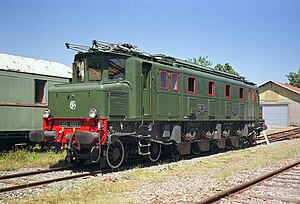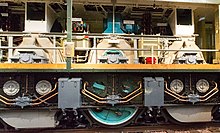SNCF Class 2D2 5500
| SNCF 2D2 5500 | |||||||||||||||||||
|---|---|---|---|---|---|---|---|---|---|---|---|---|---|---|---|---|---|---|---|
 | |||||||||||||||||||
| |||||||||||||||||||
| |||||||||||||||||||
| |||||||||||||||||||
| |||||||||||||||||||
The 2D2 5500 were electric locomotives operated by the Compagnie du chemin de fer de Paris à Orléans, then SNCF in France, in operation from 1933 to 1980.
Design and operation

This class originated on the PO with the two E 501–2 class locomotives of 1925. These had four traction motors, one per axle, driving through Buchli drives and following Swiss practice. They were considered to be more reliable in service than other PO electric locos.[3]
The locomotives operated from a 1,500 V DC catenary with two pantographs, powering four 1,000 horsepower (750 kW) motors. Each locomotive had over 5,000 metres (16,000 ft) of wire for the series-wound electric motors. The driver would start the engines in series, with only 1⁄4 voltage applied at 350 A. The resistance applied to the engines was progressively removed and the locomotive's speed increased, then switching to series-parallel operation and finally parallel only at 100 kilometres per hour (62 mph). Rheostatic braking was also possible, with the rotors connected in series and shunt resistances across each field winding. Engineers watched the line ahead through a circular frosted lens in the windshield.[2]


Thirty five units were ordered by the PO to run on its newly electrified Paris-Orleans-Toulouse/Bordeaux lines, numbers 503 to 537, delivered between 1933 and 1935. The next 15 locomotives were delivered until 1943 to the PO.[5]
The units travelled 220,000 km (140,000 mi) between overhauls. They were known to be very low vibration locomotives.[2]
Service history
A 1946 SNCF film shows 2D2 5550 travelling on the 211 km (131 mi) Paris-Le Mans line, noting that 2D2 units delivered before 1942 had over one million kilometres (620,000 mi) travelled, some over three million kilometres (1,900,000 mi).[2]
Post-war, the Paris-Lyon line was electrified and an improved 2-Do-2 class, the 2D2 9100 was ordered. 35 of these were delivered by 1950, but after this the rigid-framed electric locomotive was replaced by a Co-Co bogie design, the CC 7100.[3]
Preservation
2D2 5516 is preserved at Cite du Train. It was put in service in July 1933 and retired in 1978, having travelled over 7,800,000 km (4,800,000 mi).[5]
Notes
References
- ^ "Les 100 plus belles locomotives". La Vie du Rail, Supplemental issue (in French). April 1996.
- ^ a b c d Un film sur la locomotive électrique 2D2 [A Film About Electric Locomotive 2D2] (film) (in French). Section centrale cinématographique de la SNCF. 1946. Retrieved October 12, 2019.
- ^ a b c Hollingsworth, Brian; Cook, Arthur (2000). "Class 9100 2-Do-2". Modern Locomotives. Pavilion Books. pp. 98–99. ISBN 0-86288-351-2.
- ^ Robein, Francois (2020). "chapitre 10 - RMA, la passion sur tout les fronts". 50 ans de trains miniatures HO en France. LR Presse. pp. 232–249. ISBN 9782375360378.
- ^ a b "195 FOIS LE TOUR DU MONDE EN 45 ANS". Instagram post for Cite du Train. October 11, 2019. Archived from the original on 2021-12-24. Retrieved October 12, 2019.
- Davies, John. Chemins de fer du Midi and Chemins de fer de Paris à Orleans Locomotive List 1840–1938. Woodbridge, Queensland: Dr. John Davies. pp. 200–201. ISBN 0-9585541-0-2.
